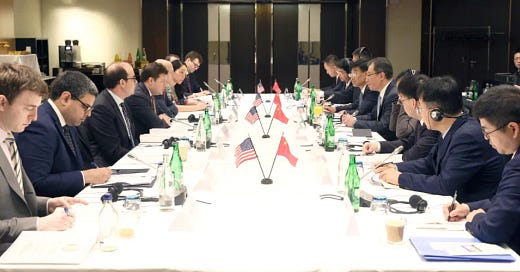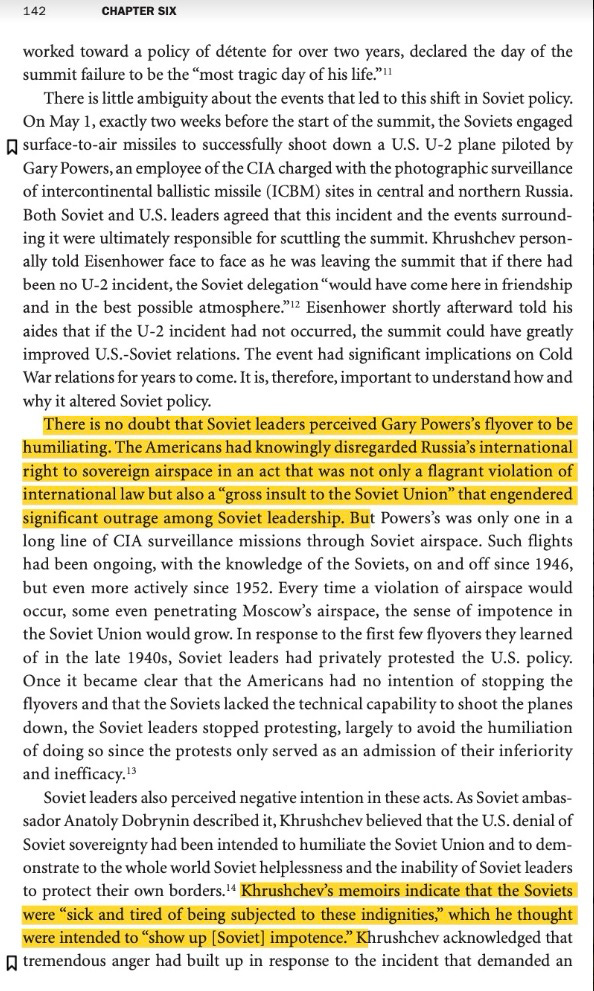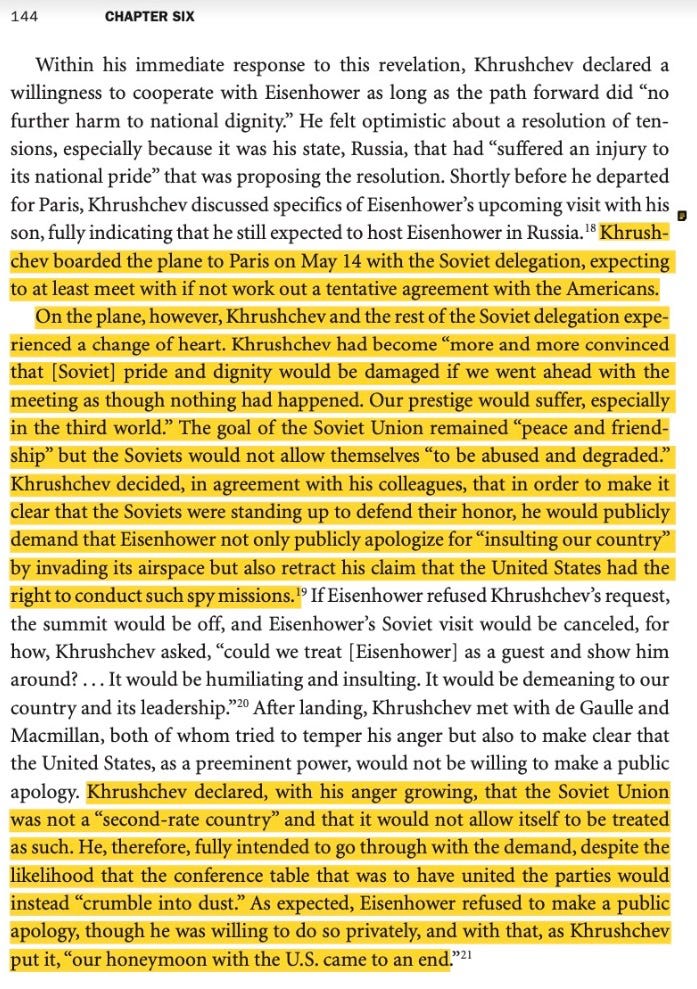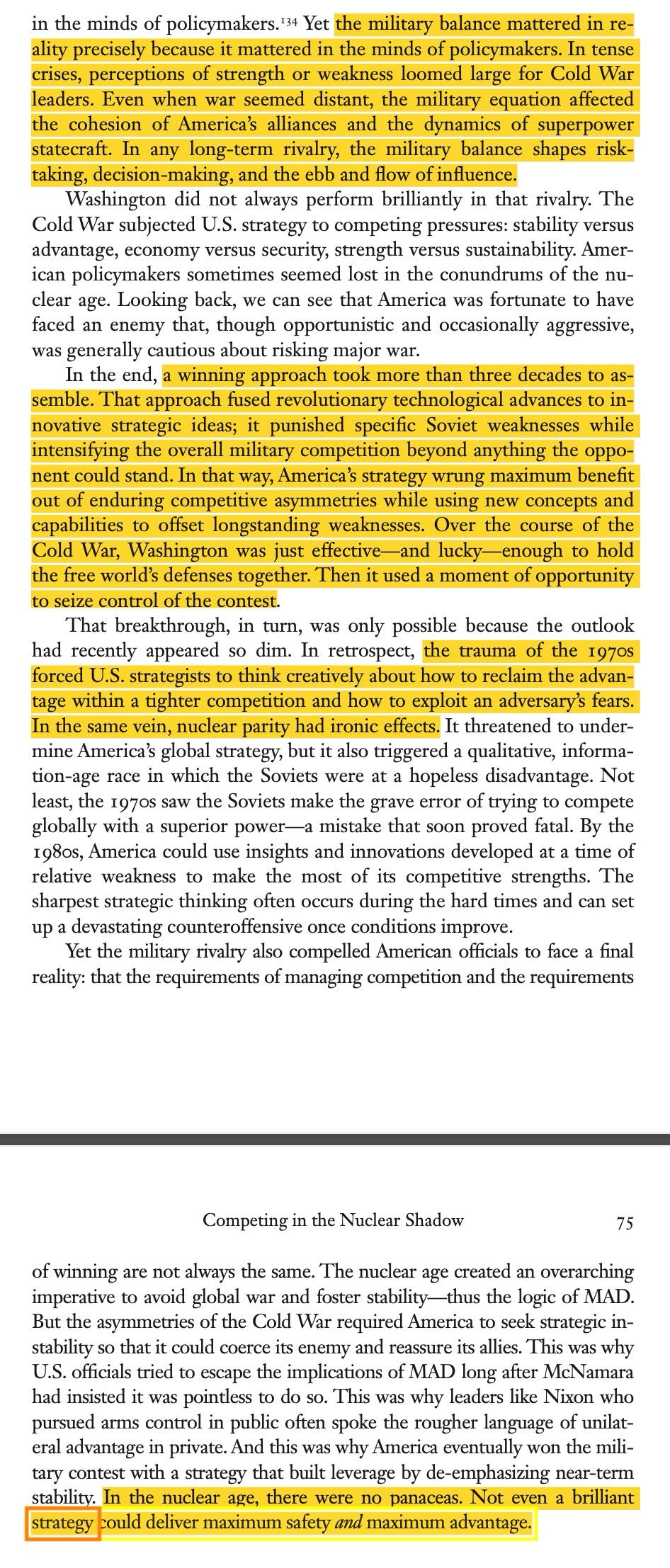I posted a short show with
discussing the technological and political implications of GPT4o and Google’s dev day. Check it out in your favorite podcast app.Last week, a Biden Administration delegation flew to Geneva to talk AI with representatives from Beijing. Many AI commentators have analogized to US-USSR nuclear negotiations, but few seems to have really read all that much history. What can we learn from actual Cold War nuclear history relevant to today’s AI discussions?
What follows are some takeaways from my reading. The first part focuses on the role of egos, the second on how technological change drove dramatic strategic swings, and the third on what talking actually gets you.
Mind the Male Egos
There’s a fantastic chapter in Joslyn Barnhart’s The Consequences of Humiliation (2020) that looks at the collapse of the 1960 Khrushchev-Eisenhower summit. The argument: Nikita Khrushchev was genuinely on the verge of pursuing detente with Dwight D. Eisenhower — and even would have stuck with it after the U-2 incident — had Eisenhower not publicly rubbed US spying capabilities in his face. Feeling, in his words, “impotent,” Khrushchev felt as though he had no choice but to escalate, not just because America had superior hardware, but because Eisenhower was committed to flaunting it.
I think the idea of the west exchanging “face stuff” on AI — high-level scientific exchanges, previews of future US commercial capabilities through an AI Safety Institute — in return for relative acquiescence to actions that materially bend future trajectories like export controls.
One dynamic that Barnhart doesn’t get into is how Eisenhower’s reaction was surely conditioned by his VP Richard Nixon on the presidential ballot coming just six months later. John F. Kennedy, having seeded the ultimately ungrounded Missile Gap argument in the broader national debate, was criticizing Eisenhower and Nixon for presiding over a degrading of America’s relative strength.
In an excellent speech a month after the talks blew up in the middle of the campaign, Kennedy beat up on Eisenhower and Nixon’s foreign policy, even as they took a tough line:
But the truth of the matter is that we were not prepared for any such negotiations — that there was no real success which the Summit could have achieved. For words and discussion are not a substitute for strength — they are an instrument for the translation of strength into survival and peace.
This is the real issue of American foreign policy today — not the ill-considered timing of the U-2, or the inconsistent statements of our government. The real issue — and the real lesson of Paris — is the lack of long-range preparation, the lack of policy-planning, the lack of a coherent and purposeful national strategy backed by strength.
We have, in 1960, most of the formal tools of foreign policy: We have a defense establishment, a foreign aid program, a Western alliance, a disarmament committee, an information service, an intelligence operation and an NSC. But we have failed to appraise and re-evaluate these tools in the light of our changing world position. We have failed to adapt these tools to the formulation of a long-range, coordinated strategy to meet the determined Soviet program for world domination — a program which skillfully blends the weapons of military might, political subversion, economic penetration and ideological conquest.
As a substitute for policy, Mr. Eisenhower has tried smiling at the Russians; our State Department has tried frowning at them; and Mr. Nixon has tried both. None have succeeded.
So let us abandon the useless discussion of who can best “stand up to Khrushchev,” or whether a “hard” or “soft” line is preferable. Our task is to rebuild our strength, and the strength of the free world — to prove to the Soviets that time and the course of history are not on their side, that the balance of world power is not shifting their way — and that therefore peaceful settlement is essential to mutual survival.
See below for a gripping arc from Barnhart that’s worth your time. The key context: Eisenhower knew the US had a clear qualitative and quantitative advantage in the balance of nuclear forces.
If you’re an historian who takes issue with this characterization, please reach out!
The Balance Won’t Be Static
Former ChinaTalk guest Hal Brands’s Cold War book Twilight Struggle featured a superlative chapter on the evolving nuclear balance of power.
The flattened narrative I’ve read in most Cold War AI analogies today is that, after the Cuban Missile Crisis, the US and USSR fell into a relatively stable state of mutually assured destruction. But shifting deployment strategies, technological capabilities, national economic trajectories, and military appetites all dramatically changed nuclear-competition dynamics over the full course of the Cold War.
What follows is an overview of the twists and turns, to give you a sense of how much changed. I expect AI to have equally if not more dramatic developments, and on much shorter timescales.
For the first five years of the Cold War, the US was the only country with a bomb. Stalin’s getting the bomb prompted the US to develop the hydrogen bomb, and Eisenhower’s “New Look” led to a massive buildup, increasing the nuclear deterrent to deter the big one. This effort was paired with Eisenhower leaning back in less critical fronts to save on conventional forces and minimize commitments abroad — reserving the right to respond, in John Foster Dulles’s words, “by means and at places of our choosing.”
Sputnik and Khrushchev’s nuclear buildup spelled the end of the New Look. Kennedy’s “Flexible Response” thought that Eisenhower’s approach was — in Brands’s characterization — “useless in combating brushfire wars and insurgencies; that it weakened NATO by requiring Europeans to believe America would commit suicide on their behalf; that it left too many gaps for a creative enemy to exploit.” Recognizing the increasing parity between the US and USSR, Kennedy reinvested in conventional options, and committed to find ways to deploy nukes that weren’t inherently cataclysmic — leading to thinking like this:
But later he came around…
This logic didn’t fly with the next two administrations! Lyndon B. Johnson threw away “no cities” and instead tried to ratchet up the tension while learning to love to bomb.
It’s only here that we started to get some strategic rationale for negotiations. LBJ and Robert McNamara didn’t opt to begin research on an anti-ballistic missile shield and began to negotiate test bans. As Brands put it, “These initiatives represented an intellectual breakthrough of sorts — a realization that safety might require prioritizing stability over advantage. The Soviets reciprocated, in their way, by dumping Khrushchev and following a less truculent policy after the missile crisis. Such crises subsequently became less frequent; the Cold War became less terrifying.”
This quickly got awkward. As it became clear that the US would be destroyed in any nuclear exchange, NATO allies began to fear that the US wouldn’t fight to protect Europe. So France got its own nukes and, as Brands writes, by the “decade’s end, it was hardly absurd to think the Soviets might fracture NATO even without the histrionics of the Khrushchev years.”
The other problem with McNamara’s logic: it required an enemy who also bought into the futility of competition. Brands writes, “Khrushchev’s successors resisted the idea that security lay in vulnerability.” When McNamara urged Premier Alexei Kosygin to forgo an anti-ballistic missile race in 1967, Kosygin angrily replied that “defense is moral, aggression is immoral!”
While the US was bogged down in Vietnam, the USSR doubled down on nuclear and conventional forces. So, finally, we get a little bit of real negotiation once the USSR hits something close to parity:
While military parity brought about this nice-looking technical negotiation, we still had leaders try to maneuver to gain an upper hand. Nixon sought to get out of the MAD strategic straitjacket by leaning into his “madman strategy” to “squeeze additional juice out of America’s forces by manipulating the balance of resolve.” Gerald Ford even got in on the action, too!
Nixon wasn’t the only one uncomfortable with strategic parity. As the Vietnam War ended, Americans soon wanted more defense spending to combat the USSR and shake loose the status quo.
Finally, by the 1980s, American technological advancements and sharper strategic thinking came to the fore. With raw nuke numbers limited by treaties, US qualitative technical advancements grew more impactful. The “offset strategy” sought to deploy “stealth fighters and bombers to render Soviet air defenses irrelevant; precision-guided munitions to wreck tank columns; improved sensors and strike capabilities to extend the battlefield deep into the Soviet rear. Technological breakthroughs were systematically eating away at Moscow’s greatest advantage: its superiority on the central front.”
Targeting Soviet leadership bunkers — ensuring they couldn’t fool themselves into believing they could survive a nuclear exchange — was particularly clever.
Ronald Reagan led a “rebellion against MAD and strategic stability” by pushing new military initiatives. He hoped to accelerate the competition to the USSR’s breaking point by increasing spending and opening up new areas of competition. For instance, Reagan sought to revive missile defenses sworn off by Nixon as too costly and technically infeasible.
While pushing these buildups, Reagan simultaneously put forward aggressive arms-control proposals. Here’s the key passage of how Brands believed Reagan’s pressure ended up playing out inside the USSR:
AI promises to be even more unstable than nukes. It generally took about a decade for a new capability to hit the battlefield in the Cold War.
Today, we’re getting new capabilities every few months!
Let’s have Brands take us out:
Talking for Talking’s Sake Isn’t the Worst Idea
has a great essay on SALT at 50. His takeaway:In other words, the dynamics today are very different, and far more open-ended: unlike by the 1970s, nuclear capabilities had settled around the “yep, we can probably both end humanity” threshold. While the idea that either side would ever voluntarily restrain domestic development before we’ve hit an obvious plateau is absurd, talking about how to channel development to increase mutual transparency seems at least not unhelpful.
One final gem from the archives: here’s JFK from 1960 on Eastern Europe, China, and arms control policy:
We must prepare and hold in readiness more flexible and realistic tools for use in Eastern Europe. The policy of "liberation," proudly proclaimed eight years ago, has proved to be a snare and a delusion. The tragic uprisings in East Germany, in Poland and in Hungary demonstrated clearly that we had neither the intention or the capacity to liberate Eastern Europe — and the false hopes raised by our promises were cruelly crushed.
We must now begin to work slowly and carefully toward programs designed to wean from their Soviet masters any dependents showing signs of discontent — to nourish the seeds of liberty in any cracks appearing in the iron curtain by reducing economic and ideological dependence on Russia. There are already opportunities in Poland for greater American initiative, aid, trade, tourism, information services, student and teacher exchanges, and the use of our capital and technology to advance the standard of living of the Polish people. Closer relationships can be offered in other so-called captive nations as well — showing a creative interest, not a closed mind, by the nation that represents their one great hope for freedom.
We must reassess a China policy which has failed dismally to move toward its principal objective of weakening communist rule in the mainland — a policy which has failed to prevent a steady growth in Communist strength — and a policy which offers no real solution to the problems of a militant China. We need to formulate proposals for a reduction of tension in the Formosa Straits — at the same time making clear our determination to defend that Island. We must act through an Asian regional development organization to stabilize the nations of non-communist Asia both politically and economically, so as to strengthen their resistance to communist pressures. And, although we should not now recognize Red China or agree to its admission to the United Nations without a genuine change in her belligerent attitude toward her Asian neighbors and the world — and regrettably there is evidence that her belligerence is rising rather than receding — we must nevertheless work to improve at least our communications with mainland China. Perhaps a way could be found to bring the Chinese into the nuclear test ban talks at Geneva — so that the Soviets could not continue their atomic tests on the mainland of China without inspection — and also because Chinese possession of atomic weapons could drastically alter the balance of power. If that contact proves fruitful, further cultural and economic contact could be tried. For only in this way can we inform ourselves of communist activities, attempt to restore our historic friendship with the Chinese people, and make sure that we are not plunged into war by a Chinese miscalculation of our determination to defend all of free Asia. Today we have no affirmative policies — only an attitude of negative resistance — with the chance of dangerous action stemming from mutual miscalculation. This cannot last in a world where the Red Chinese are increasingly important, increasingly menacing, and increasingly impossible to omit from effective international agreements on subjects such as arms control.
We must begin to develop new, workable programs for peace and the control of arms. We have been unwilling to plan for disarmament, and unable to offer creative proposals of our own, always leaving the initiative in the hands of the Russians. An Arms Control Research Institute could undertake the technical studies needed before we can detect and monitor the vast and complex weapons systems of modern warfare. The entire world hopes that the collapse at the Summit has not destroyed man's hope for a nuclear test ban. But if such a ban is achieved, it must only be the first step toward halting the spiralling arms race that burdens the entire world with a fantastic financial drain, excessive military establishments, and the chance of an accidental or irrational triggering of a worldwide holocaust. At the same time we must move toward the eventual rule of international law by working to strengthen the United Nations and to increase its role in resolving international conflicts and planning for international scientific and economic development.




















